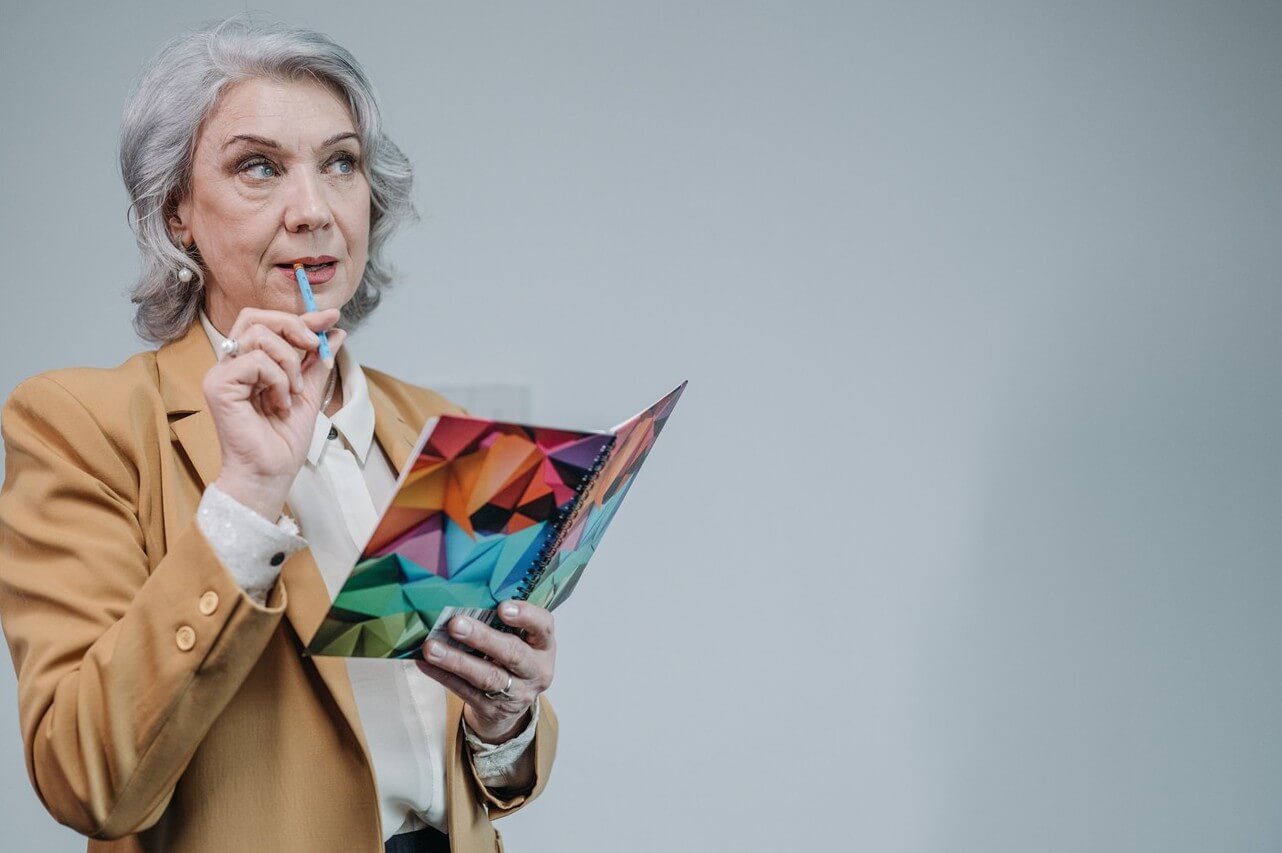Did you know your brain is designed to forget? It’s true – that is not a misprint! Your brain filters out unnecessary information to prevent overload, allowing you to focus on what’s important. To enhance your memory, you need to give your brain clear signals about what’s important and what you want to recall later.
So how do you do that?
Here are five science-backed strategies to boost your memory:
1. Pay Attention with Purpose
Don’t expect to remember things you have glanced at (or half-listened to) for a second or so.
Memory formation begins with focused attention, and you need to concentrate for at least seven seconds if you want to remember something later. Try it—it may seem like a long time, but if you spend this time repeating, connecting, or visualizing the data, you’ll dramatically increase your chances of accurate recall later on.
Research also shows that mindfulness meditation enhances attention and memory by inducing changes in brain areas associated with these functions.
Try This:
• Practice mindfulness meditation for a few minutes daily to improve focus.
• Engage multiple senses when learning—associate information with specific scents or sounds to create stronger memory cues.
2. Create Multiple Memory Traces
Connecting new information to existing knowledge strengthens memory. The more memory traces, the more pathways your brain has to retrieve those lost keys, glasses, or wallet.
Techniques like the Method of Loci, visualizing information in familiar spatial environments, have been proven effective in helping your brain create these multiple connections.
Try This:
• Use mnemonic devices such as acronyms or visual imagery.
• Teach the information to someone else to reinforce your own understanding and recall.
3. Revisit Information Strategically
There’s an old saying: “Practice makes perfect”—and when it comes to memory, that’s absolutely true. If you want to increase your chances of recalling something accurately, you need to review the information multiple times.
Studies show that reviewing new information at least five times—especially across multiple days—dramatically boosts retention.
Ebbinghaus, a German psychologist in the 19th century, was the first to document how quickly we forget information without review. (Think of the classic “forgetting curve.”) The key is spaced repetition: reviewing material at increasing intervals, rather than last-minute cramming.

Try This:
• Write key points on sticky notes and place them where you’ll see them often—like on your fridge, bathroom mirror, or laptop.
• Move or rotate them every few days to strengthen memory through simple repetition.
4. Organize Your Environment
A clutter-free environment reduces distractions, helping you focus and remember more effectively.
Consistently organizing personal items creates memory cues and routines, reducing the chances of misplacing things.
Try This:
• Designate specific spots for commonly used items (e.g., hooks for keys, a drawer for your wallet) and be intentional as you place them there.
• Keep a single, organized calendar or planner for appointments and to-do lists.
5. Support Your Brain Health
Physical activity, sleep, and nutrition are foundational for memory. But don’t stop there—add regular social contact, hydration, and mental variety to keep your brain thriving.
Your brain grows and adapts throughout your lifetime, especially when it’s challenged with new and meaningful experiences.
Try This:
• Engage in at least 150 minutes of moderate-intensity exercise per week.
• Aim for 7–9 hours of quality sleep each night.
• Eat a diet rich in omega-3s, antioxidants, and whole grains.
• Do something different every day—read a new book, walk a different route, or try a new recipe. Variety fuels brain growth.
Forgetfulness doesn’t have to be the story of your life. By implementing these strategies, you can strengthen your memory and support long-term brain health.
For more personalised guidance, explore our 7-Day Brain Boost Plan by New Zealand memory experts Dr. Allison Lamont, PhD & Gillian M. Eadie.
Need help getting started? Reach out – we’re here to support your Brainfit journey.






You are so right, I now keep a diary near me and make sure I put it in the same place each time I have written in it, same as my house and car keys, less to think about.
I am also always asked by my husband in the supermarket what was on the list we stick on the fridge at home? But I faithfully tear off the bottom bit where he or I have written what we want and no bother remembering or forgetting. The mind is getting a workout not forgetting to take the note along and where my house and car keys are! It is so used to these positions I don’t even have to think about it!
I have never regretted enrolling in your Memory Course Ladies!
Memory Traces are great
I do appreciate your emails – just as much as the course you ladies ran at Selwyn College! keep those wonderful hints coming!
It’s important to keep a check on taking your meds. I have a notebook with columns for a week at a time and put a tick on Monday, Tuesday, etc. a.m. and p.m. Then I know I haven’t forgotten to take them.
I ALWAY REMEMBER AND USE THE – 7 – SECONDS” METHOD AFTER READING THE BOOK
A FEW YEARS AGO.. THANKS.
An excellent tip! Thank you. Getting organised is half the battle won, isn’t it?
Thank you – we love hearing from our readers and class members. Keep up those memory strategies – they can change your life!
Even writing that list is a way of processing information – then your brain knows that you really want to remember. You (and your brain) will get so clever at it, you’ll find you know what is on the note, even if you misplace it between home and the supermarket. Great organisation, too!
We are so glad you are putting those strategies into practice! Memory traces are easy to make – we just have to remember to attach them to information that is important. Well done!
I discovered I was sometimes leaving the garage door open overnight which was not good even tho I don’t have internal access; so I devised a scheme!! Every time I closed the door I would put the keys at one end of the table and if they were not there I would look out the window and there was the garage door—— open! I then closed the door every time I came in from where ever and put the keys at the correct end of the table and soon it became a habit even if I was only in and out. Now the habit has stuck and I don’t even have to think about it. Come in, shut garage door, put keys at right end of table and get on with something else. If by chance the keys are not where they should be there has been a glitch somewhere, maybe the phone is ringing, and sure enough the garage door is open. It works like a charm so one frustration less.
I do enjoy reading your memory tips especially remembering peoples names. I was at a function last weekend and each time I met someone new I repeated their name a couple of times and it certainly helped to remember it. One lady’s name was Mary and I related it to Mary Had a little lamb, so didn’t forget it.
I also have a calendar on the wall by my desk at home and every thing is written on that. I highlight special appointments so that it stands out.
Well done! Putting those strategies into practice is the key to improving your memory!
Thank you for helping us all to improve and establish memory traces. My GP has told me today that the medication I am on may affect my memory, so I will work harder at your fun tasks to compensate
That’s a sound plan. And give your brain time to complete tasks as the brain connections may take a little longer when you are taking medication – but they will be working for you!
I always enjoy reading your emails. Got my grandson to show me how to use notes on my mobile. Great memory aids for all sorts of things!
A great idea! Grandchildren can teach us a lot about using technology. And don’t they love teaching us, too? Once you know how, a whole world opens up to us. Well done!
Thankyou so much I was really interested in your talk. I am putting things in place so it will become easier for me.
Glenys
Well done, Glenys. Find a brain challenge everyday! Have you tried these? https://www.brainfit.world/2015/07/22/memory-skills-practice-videos/
Like nearly everyone I know, I find it both inconvenient and time-consuming (let alone embarrassing!) to be trying later to track down someone I’ve just met whose name I’ve forgotten before I’ve even finished my conversation with them! The trick of repeating the name two or three times after being introduced works a treat!
I enjoyed your talk at PROBUS the other day. All my appointments etc go on my
calendar and I prefer that to a diary. I also put a hook on the wall above my jug
for my keys as I often put them down anywhere then wasted time looking for them.
A tip I read a few years ago to recall forgotten information was to move my eyes
from side to side so the two brain hemispheres came together and the information
would either come to mind immediately or a few minutes later. I was very sceptical
but decided to give it a go and it definitely works. I have mentioned it to several
friends, some think it’s a joke and others have tried it and are amazed that it actually
works. Best tip I have read for memory recall. You keep your head still and just move
your eyes.
Hello there
Thank you for this tip and it is one more way to make sure your brain pays attention to what it is you want to recall later. Paying attention and keeping your focus are important for moving information from your sensory memory into your short-term memory. Thank you for sharing this great tip – we love to hear about the ones that work!
Thank you very much. I enjoyed your talk on Monday and am sure it will be Helpful.
Thank you for your message and I am so glad you enjoyed the session in Whangamata. You all live in such a beautiful part of the world!
What a beautiful thing to learn these different ways of remembering in 3 seconds, my brain starts activating. As the saying goes, use it or you lose it. So true! Thank you FYI.
Greta Fisher. Thank you ladies, Gratitude. Reached age of new Driving Licence. New doctor said it was a test for Dementia, I thought it was a joke, anyway, one question was a list of numbers – I remembered four out of six, then had a conversation with Nurse, then suddenly she asked ‘What were those numbers’. Brain had not recorded but remembered two. Was given 80% pass, then the young nurse said ‘I could not have done that’! Have new Driving Licence. Keep me at it dear ladies, guess what I loaned your book out, was never returned.
Congratulations, Greta! That Driving test is quite searching so 80% is a very commendable score. Funny you should say that about your 7-Day Brain Boost Plan (or was it Seven Second Memory?) – we get quite a lot of re-orders because people have loaned the book to friends never to see it again!